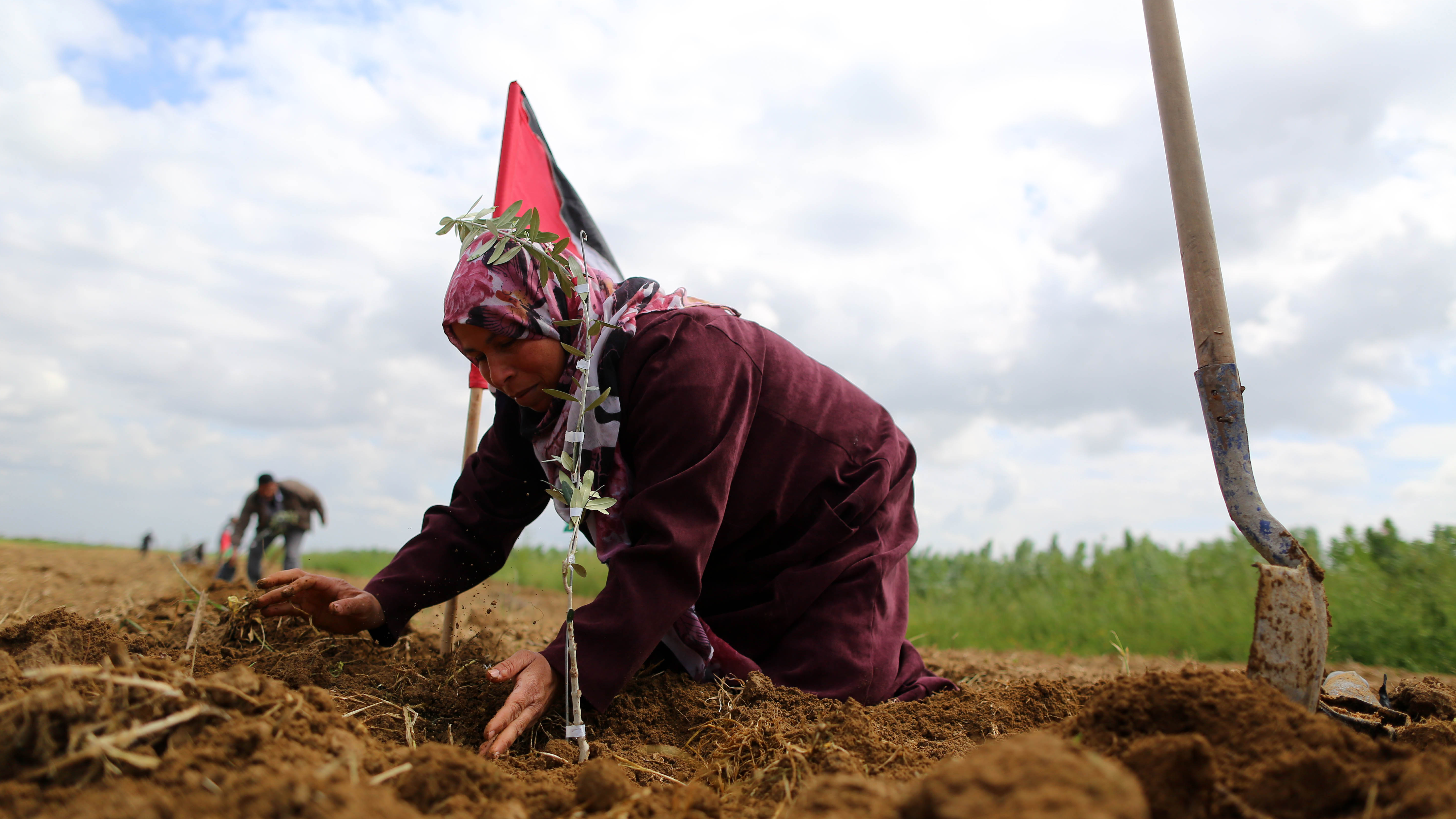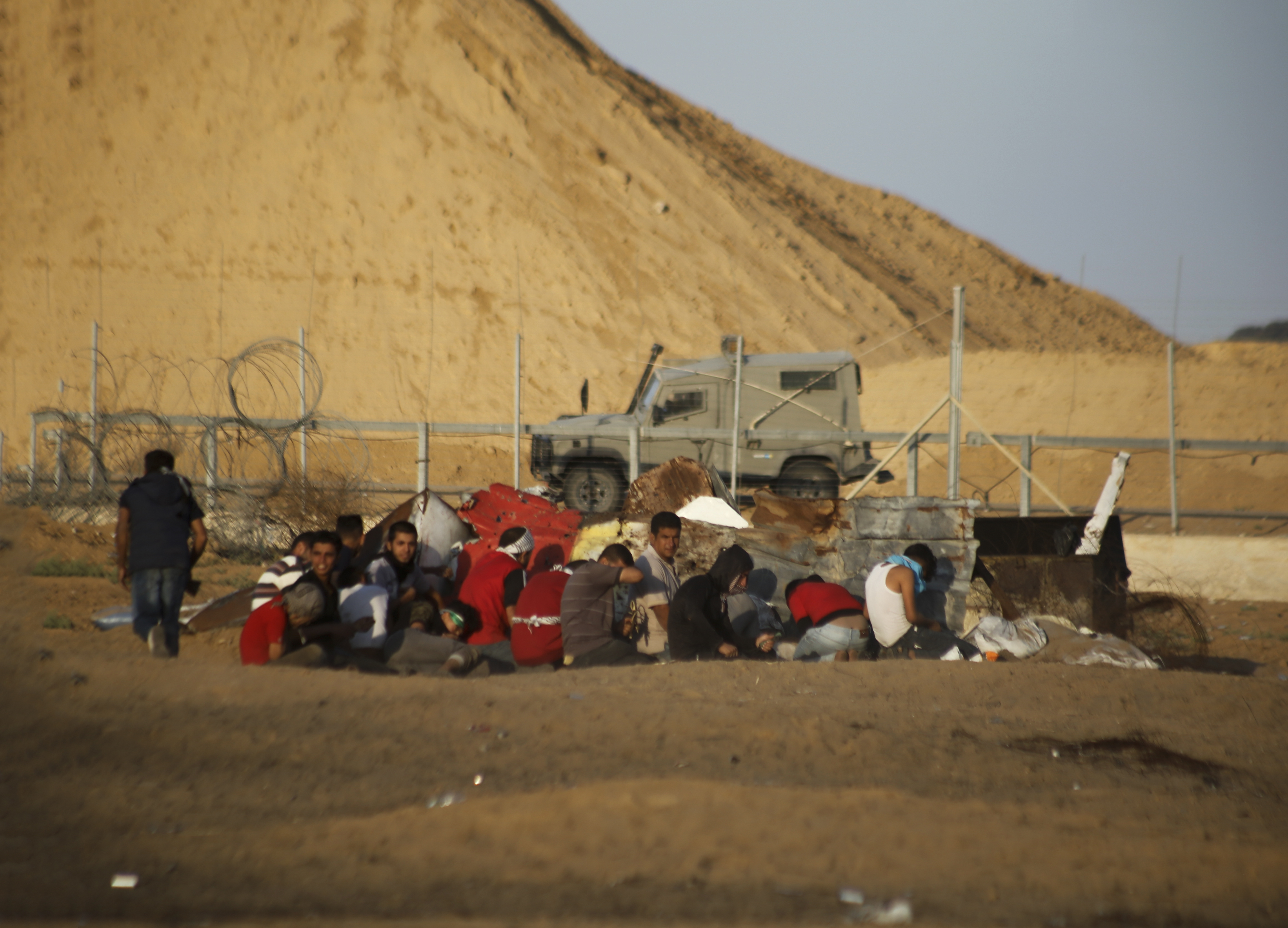
Palestinians are planting olive trees near the border between Gaza and Israel during a protest marking Land Day at the border between Israeli and Gaza Strip, March 29, 2016. /Getty
Palestinians are planting olive trees near the border between Gaza and Israel during a protest marking Land Day at the border between Israeli and Gaza Strip, March 29, 2016. /Getty
Editor's note: Haider Rifaat is a writer for the South China Morning Post, Arabian Moda magazine, Good Times magazine and OK! Pakistan. The article reflects the author's opinions, and not necessarily the views of CGTN.
Palestine and Israel are at war with each other – again. Earlier this month, Israeli forces made efforts to drive out Palestinian families from the Sheikh Jarrah neighborhood, allowing Jewish families to replace them. According to Rupert Colville, a spokesperson of Office of the High Commissioner for Human Rights (OHCHR), if evictions of such nature materialize, they would violate Israel's commitments under the international law.
The eviction battle resulted in protests, and on May 10, Israeli forces barged into Masjid Al-Aqsa and attacked Palestinians with tear gas and rubber-coated rounds. An act of violence, incited during the month of Ramadan, not only represented religious intolerance but exacerbated war-like circumstances. Violence has since escalated as the world stands in solidarity with Palestine.
So far, 10 have died in Israel but these casualties are insignificant compared to 192 Palestinians killed in Gaza, 58 of whom are children. The Israeli military is continuing attacks on the Gaza strip without de-escalating the state of affairs.
Muslim majority countries – Indonesia, Lebanon, Iraq, Qatar and Turkey – have voiced support for Palestine in the form of official statements and demonstrations. Protesters also gathered in the UK, Spain, Germany and Kashmir to champion freedom for Palestine. However, France and the United States feel otherwise. France's Interior Minister Gerald Darmanin took to Twitter to lay off pro-Palestine protests in the country, which is an indication of deteriorating civil rights for Muslims in France.
The U.S. government is already under fire for making insufficient efforts to counterbalance a war-like zone in Jerusalem. President Biden made a tone-deaf statement earlier, claiming that "Israel has a right to defend itself," not realizing that the number of casualties in Gaza outnumber Israel. Moreover, Israeli forces prompted violence in Masjid Al-Aqsa, not Palestinians. The country continues to wreak havoc in Gaza while the Biden administration sleeps on the crisis without doing much to calm its ally.
While the U.S. champions human rights at large, supporting movements like the Black Lives Matter, it conveniently dismisses gross human rights violations against Palestinians, who are suffering far worse than racial violence. They have long been subject to apartheid, evictions and unjust military treatment. The United States is probably downplaying the degree of violence in Gaza to safeguard its geopolitical, economic and military interests with Israel.
In the wake of rising violence in Gaza, United Nations Security Council (UNSC) held a virtual meeting to address the ongoing tussle between Palestine and Israel. Chinese State Councilor and Foreign Minister Wang Yi called out the U.S. for blocking UN Security Council calls earlier, claiming that the U.S. took a position that stood on the opposite side of international justice. The U.S.'s procrastination could have further escalated tensions in Gaza, and deepened fears of a full-fledged war. However, the U.S. seems willing to offer support if Israel and Palestine decide to put an end to crossfire attacks.

Palestinian demonstrators take cover from Israeli forces during an anti-Israel demonstration calling for an end to the years of siege on the Israel-Gaza border in southern Gaza. /Getty
Palestinian demonstrators take cover from Israeli forces during an anti-Israel demonstration calling for an end to the years of siege on the Israel-Gaza border in southern Gaza. /Getty
Palestinian Foreign Minister Riyad al-Malki told the UNSC that Israel feels emboldened to kill families each time a foreign leader talks about the right to self-defense. Israel's UN Ambassador Gilad Erdan also stated his position on the issue, claiming that Israel uses its missiles to protect its children while Hamas uses children to protect its missiles. Erdan's statement comes across as intellectually dishonest, considering that the Israeli armed forces invaded Masjid Al-Aqsa and declared war on Palestine. They incited unnecessary violence that triggered a response from Hamas, and rightfully so.
Even India's Permanent Representative and Ambassador to the UN T.S. Tirumurti expected "immediate de-escalation" between Israel and Palestine going forward. However, it was hypocritical to call for de-escalation in the Middle East given that Indian armed forces jailed 21 Kashmiris simply for voicing support for Palestine.
Hopefully, the UNSC dialogue would minimize atrocities in Gaza. However, Israel-Palestine relations have remained strained for decades now, and issues concerning peace in the region cannot be resolved in one sitting. The U.S.'s intervention and the UN Security Council's condemnation of the attacks could de-escalate the situation but the end decision lies with the Israeli government and how it wishes to proceed with Palestine. Israeli Prime Minister Benjamin Netanyahu stated earlier that the "war" would go on for as long as necessary and that Washington seems to be on Israel's side. The military continued to bomb the Gaza strip over the weekend, and there seemed to be no plans of downgrading violence in Palestine.
A 2020 Human Rights Watch report found that 80 percent of Palestinians rely on humanitarian aid while two million had restricted access to clean water, electricity supply, education and health facilities – all attributable to Israel's closure of Gaza, and border restrictions put in place by the Egyptian government.
Israel has been flaring up terrorism in Gaza, and the current death toll is a clear indication of it. The government's quest to dominate Gaza needs to be recognized and called out by major international leaders and human rights organizations. The UN must devise a long-term strategy to establish peace between Israel and Palestine while engaging the U.S. and other Muslim majority countries. Keeping the conversation going would offset the number of attacks in the region. It is high time that a two-state solution is seriously considered if peace is to establish permanently between Israel and Palestine. The U.S. should also rethink its diplomatic ties with Israel and prioritize peacemaking in the Middle East.
(If you want to contribute and have specific expertise, please contact us at opinions@cgtn.com.)

